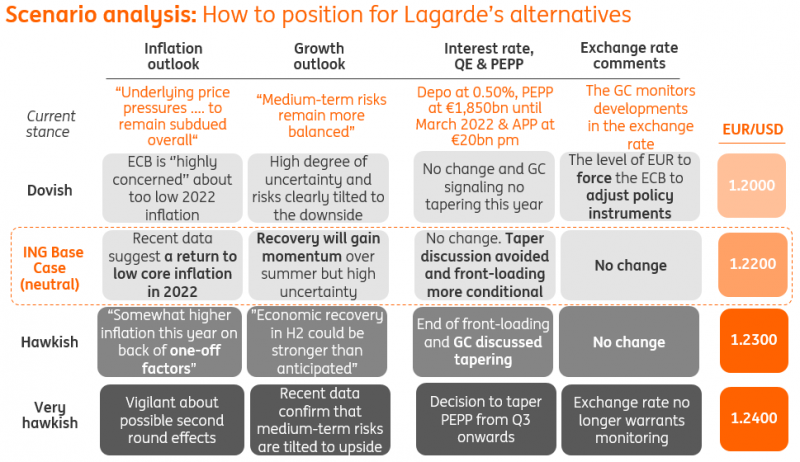As the ECB officials already adjusted market expectations for the ECB meeting tomorrow and no tapering is expected, the impact on EUR/USD should be limited. On balance, risks are skewed to modestly higher EUR/USD as expectations are low and communication missteps cannot be ruled out. But expect generally unaffected EUR/USD.

Unsplash

Source: ING
Limited impact on EUR
We expect the ECB to avoid any tapering talk, but given that this has already been communicated by ECB officials (see the ECB Preview for more details), this should not come as a surprise to markets and in turn, should have a limited impact on EUR (FXE).
Given the expectations of no change in guidance on asset purchases, the balance of risks is modestly skewed to a higher EUR, should the press conference not reiterate the tapering on hold message strongly enough or deliver some communication missteps.
While not our base case, the probability of this outcome is in our view higher than of an even more dovish message vs the current already cautious market expectations. Hence the balance of risks is skewed to modestly higher EUR/USD, even if our base case is for a largely unaffected EUR/USD after the meeting.
As an aside, we note that comments from Banque de France Governor, Villeroy de Galhau, in late May did coincidentally put a top in EUR/USD at 1.2250. He said the ECB would be as least as patient as the Fed. We read this as an expression of EUR/USD sensitivity from the ECB and it will be interesting to see whether these comments re-appear in some form. Typically, central bankers would be reluctant to discuss the policy of their central banking peers at a high-profile rate meeting. And remarks of relative monetary policy settings could be frowned upon in Washington as a quasi means of verbal intervention.
The constructive outlook for EUR/USD remains intact
Beyond the June ECB meeting, we retain our constructive view on EUR/USD and target the 1.25 level this summer.
The upcoming improvement in Eurozone data and the growth outlook should help limit the US and Eurozone (EZU) growth wedge. With the Fed remaining cautious and presiding over deeply negative US front-end real rates, the subsequent soft USD environment should help facilitate higher EUR/USD.
Also, with the global economy showing signs of more synchronized recovery, the EUR should benefit more given the openness of its economy
Disclaimer: This publication has been prepared by the Economic and Financial Analysis Division of ING Bank N.V. (“ING”) solely for information purposes without regard to any ...
more
Disclaimer: This publication has been prepared by the Economic and Financial Analysis Division of ING Bank N.V. (“ING”) solely for information purposes without regard to any particular user's investment objectives, financial situation, or means. ING forms part of ING Group (being for this purpose ING Group NV and its subsidiary and affiliated companies). The information in the publication is not an investment recommendation and it is not investment, legal or tax advice or an offer or solicitation to purchase or sell any financial instrument. Reasonable care has been taken to ensure that this publication is not untrue or misleading when published, but ING does not represent that it is accurate or complete. ING does not accept any liability for any direct, indirect or consequential loss arising from any use of this publication. Unless otherwise stated, any views, forecasts, or estimates are solely those of the author(s), as of the date of the publication and are subject to change without notice.
The distribution of this publication may be restricted by law or regulation in different jurisdictions and persons into whose possession this publication comes should inform themselves about, and observe, such restrictions.
Copyright and database rights protection exists in this report and it may not be reproduced, distributed or published by any person for any purpose without the prior express consent of ING. All rights are reserved. ING Bank N.V. is authorised by the Dutch Central Bank and supervised by the European Central Bank (ECB), the Dutch Central Bank (DNB) and the Dutch Authority for the Financial Markets (AFM). ING Bank N.V. is incorporated in the Netherlands (Trade Register no. 33031431 Amsterdam). In the United Kingdom this information is approved and/or communicated by ING Bank N.V., London Branch. ING Bank N.V., London Branch is deemed authorised by the Prudential Regulation Authority and is subject to regulation by the Financial Conduct Authority and limited regulation by the Prudential Regulation Authority. The nature and extent of consumer protections may differ from those for firms based in the UK. Details of the Temporary Permissions Regime, which allows EEA-based firms to operate in the UK for a limited period while seeking full authorisation, are available on the Financial Conduct Authority’s website.. ING Bank N.V., London branch is registered in England (Registration number BR000341) at 8-10 Moorgate, London EC2 6DA. For US Investors: Any person wishing to discuss this report or effect transactions in any security discussed herein should contact ING Financial Markets LLC, which is a member of the NYSE, FINRA and SIPC and part of ING, and which has accepted responsibility for the distribution of this report in the United States under applicable requirements.
less
How did you like this article? Let us know so we can better customize your reading experience.




